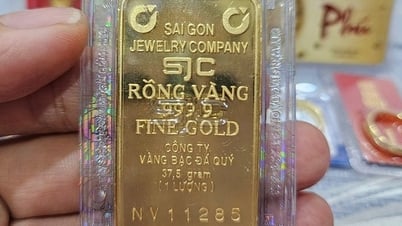Education is the foundation
Recently, the whole society has been shaken by witnessing many cases related to businesses: The owner of a national-scale corporation took advantage of trust, deceiving consumers of thousands of billions of dong; a real estate corporation illegally appropriated capital, causing tens of thousands of investors to suffer; a pharmaceutical company manufacturing fake drugs profiting from the pain of patients; "virtual charity entrepreneurs", disguised financial investments, multi-level capital mobilization...
Authorities also discovered many establishments producing counterfeit goods, counterfeit goods, people trading dirty food, false advertising... Among them, there were businesses that were once reputable, or famous people who were trusted and loved by the public.
The continuous revelations seem to be shaking the trust of society. People are bewildered when values that seemed to be sustainable suddenly collapse. The question is how to make every individual enter the business world with an upright heart, how can decent businessmen become the standard in the new era, how can business ethics become the most important criterion, placed on par with criteria of profit and revenue?... Perhaps, right now, we need to start with education, with a monitoring mechanism and timely honoring to be able to cultivate a generation of honest businessmen, nurturing a healthy business.
Talking about business ethics education, an expert commented: we are focusing too much on teaching students how to make money and not enough on how to make money honestly. This is a big gap in education.
At many of the world's leading business schools, Business Ethics is not a minor subject, but an important part of the business training program. Students are taught how to make decisions in situations where interests and ethics conflict, and are analyzed in real-life situations to identify the boundaries between right and wrong, ethical and unethical.
In recent times, many universities in our country have included subjects on Business Ethics and Social Responsibility in their official curriculum. However, many universities that provide training in business and management still underestimate the role of ethics in their curriculum.
We need more than that: an educational philosophy that promotes integrity, fosters a sense of community, and inspires a spirit of commitment to social progress instead of chasing achievements or a "get rich quick" mindset.
According to experts, in addition to focusing on business ethics education at schools, business training centers and national startup programs should also supplement educational content on professional ethics, business law and the social impact of business decisions, thereby forming a generation of young entrepreneurs with a solid ideological foundation.
Monitor and honor honest businesses
To have a decent business environment, we cannot rely solely on voluntariness. A business environment lacking an effective monitoring mechanism, where criminals can easily circumvent the law to profit, will make it difficult for honest businesses to survive and develop. Building a transparent, fair and deterrent legal system is a prerequisite to protect honest businesses.
 |
In addition to focusing on business "calculus", decent businesses also need to promote social responsibility. (Source: CSR) |
In fact, in recent times, Vietnam has made many strides in tightening the supervision of business activities, from combating transfer pricing and tax evasion to strictly handling acts of commercial fraud, environmental destruction, and the destruction of counterfeit goods... However, there is still a "gap" in the supervision of business ethics: how to clearly distinguish between businesses with legitimate profits and businesses with unethical profits?
This is where the need for corporate evaluation indexes based on ethical standards, social responsibility and transparency comes in. Tools such as the Corporate Integrity Certificate, Social Responsibility Rating, or the Kind Business Award, if properly organized and effectively communicated, will be a valuable “passport” to help reputable businesses gain the trust of consumers and investors.
In 2023, the Vietnam Chamber of Commerce and Industry (VCCI) in collaboration with the Towards Transparency Organization launched the Business Integrity Initiative (VBII), creating a network of businesses committed to no bribery, no corruption, and transparency in governance.
Resolution 68-NQ/TW dated May 4, 2025 also established a set of criteria for evaluating private enterprises according to international standards: Compliance with the law, job creation, contribution to the state budget, participation in social security activities. These are the "bright spots" for creating the foundation for building a transparent and decent business environment.
In the journey to build a decent business environment that promotes business ethics, the media story is also an extremely important factor. It is not difficult to see that the media is still too biased towards praising business achievements through "huge" revenue figures. On social networks, young "entrepreneurs" are often communicated not with their efforts and contributions to society but with factors such as "super cars", luxurious parties, dating famous beauties... This information is inadvertently distorting the view of businessmen, glorifying materialism and enjoyment.
We need more decent communication, which is not only about providing information to attract views but also about clarifying the bad and contributing to nurturing the model of responsible businessmen. These are stories about business owners who treat their workers with kindness, businessmen who accept reduced profits to keep prices stable, businessmen who choose the difficult path to bring quality and safe products to consumers... This is the content that needs to be communicated to strongly inspire generations of businessmen, helping society shape the standards of true businessmen.
The media also needs to be stronger in its role as an ethical “gatekeeper”, saying no to encouraging businessmen to show off and “polish” their names through non-transparent charity tricks or “hypocrisy” under the guise of CSR (corporate social responsibility).
In an era where consumers increasingly tend to choose products from transparent, green - clean - healthy businesses, ethics is not only a must, but also a sustainable competitive advantage.
No longer just a slogan, many large corporations in the world are required to publish social impact reports and ESG (environmental - social - governance) responsibilities as a condition for accessing investment capital and global partners.
In Vietnam, businesses are gradually realizing that: doing business honestly is the only way to go the long way. We are fortunate to have many generations of honest, upright, talented businessmen. Those who have created "national brands" in many fields. They not only enrich themselves, their families, and contribute to creating jobs for millions of workers, but also have a responsibility to society by providing quality products and services, and by participating in social charity activities. Their business activities contribute to enriching the country. They are living "prototypes" for the business ethics lessons that schools need to teach and the media needs to highlight.
In the new era, entrepreneurs not only shoulder the responsibility of making money, but also co-create society. The new era requires a new standard, and business ethics is the foundation for building a Vietnam that not only develops, but also develops in the right direction, develops in a humane way.
During his lifetime, President Ho Chi Minh paid great attention to the business community. Many times, he met, contacted and advised them on how to do business in a way that “benefits the country and the people”. Uncle Ho always valued business ethics. He emphasized that the business community must build a strong and prosperous economy by being honest, legal and for the benefit of the country and the people. He called on businessmen to “invest capital in projects that benefit the country and the people”, meaning not only for profit, but for the common prosperity of the nation. This is the first principle of business ethics: businessmen cannot be separated from social responsibility, cannot get rich on the hardship of the community.
Source: https://baophapluat.vn/dao-duc-kinh-doanh-can-duoc-vun-boi-tu-goc-post551049.html
























































































![[OCOP REVIEW] Tu Duyen Syrup - The essence of herbs from the mountains and forests of Nhu Thanh](https://vphoto.vietnam.vn/thumb/402x226/vietnam/resource/IMAGE/2025/6/5/58ca32fce4ec44039e444fbfae7e75ec)







Comment (0)